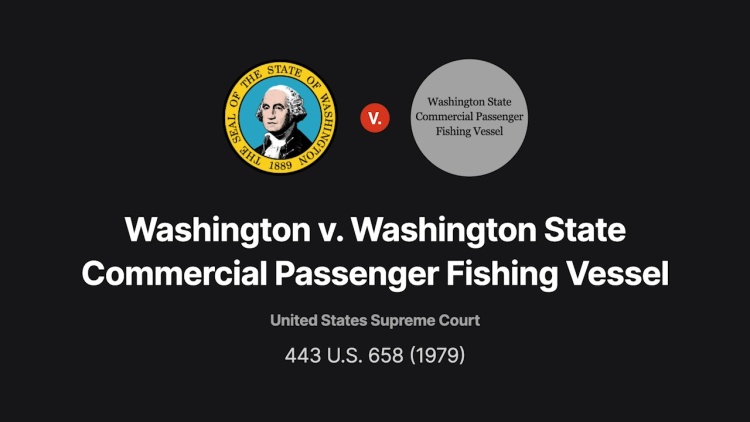Washington v. Washington State Commercial Passenger Fishing Vessel Association
United States Supreme Court
443 U.S. 658, 99 S.Ct. 3055, 61 L.Ed.2d 823 (1979)
- Written by Lauren Groth, JD
Facts
The United States entered a series of treaties with Indians living in the area of the Cascade Mountains. In these treaties, the Indian tribes agreed to give up their rights to certain lands in exchange for money and a continued right to take fish on those lands, in common with all other individuals. In 1970, the United States (plaintiff) filed a lawsuit in the United States District Court for the Western District of Washington, seeking a declaratory judgment concerning the extent of Indian rights to take fish and an injunction to require the State of Washington (defendant) to protect those rights. The United States argued that the right to take fish entitled the Indians to a 50 percent share of all harvested fish that crossed Indian access areas, or enough to support the tribes, whichever was less. Washington’s Department of Game argued that the Indians were entitled to only an opportunity to catch fish, including the right to cross private lands to access fishing spots and the right to avoid license fees. The district court agreed with the United States and held that the Indians were entitled to a 45 to 50 percent share. The court also ordered Washington to promulgate regulations to protect those rights. Washington refused. In response, the district court issued a series of orders to federally regulate Indian fishing rights, and the United States Court of Appeals for the Ninth Circuit modified but affirmed. The United States Supreme Court granted certiorari.
Rule of Law
Issue
Holding and Reasoning (Stevens, J.)
Dissent (Powell, J.)
What to do next…
Here's why 907,000 law students have relied on our case briefs:
- Written by law professors and practitioners, not other law students. 47,100 briefs, keyed to 996 casebooks. Top-notch customer support.
- The right amount of information, includes the facts, issues, rule of law, holding and reasoning, and any concurrences and dissents.
- Access in your classes, works on your mobile and tablet. Massive library of related video lessons and high quality multiple-choice questions.
- Easy to use, uniform format for every case brief. Written in plain English, not in legalese. Our briefs summarize and simplify; they don’t just repeat the court’s language.





